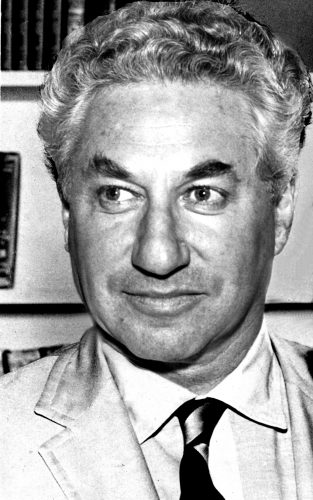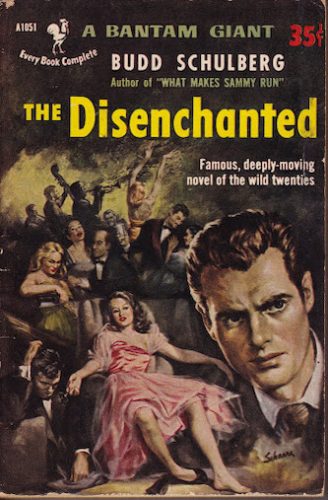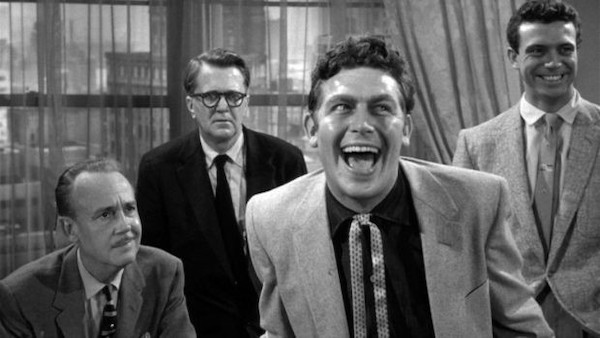Film Interview: Budd Schulberg on Being a Screenwriter in Hollywood
By Gerald Peary
“It’s really time for us to scrape off this cynicism and take a good hard look at what is happening in this country. There’s so much fakery and we don’t mind it.”

Screenwriter Budd Schulberg in 1967. Wiki Common.
In 2003, I brought retired author and screenwriter, Budd Schulberg, to speak at the Boston University Cinematheque. I consider The Disenchanted, his fictionalized novel of the life of F. Scott Fitzgerald, as one of the unsung masterpieces of American literature. Schulberg is more famous for his novel What Makes Sammy Run, and for his screenplays for On the Waterfront and A Face in the Crowd. He’s infamous for being a “friendly witness” and testifying before HUAC about Communists in Hollywood. A lifetime liberal, Schulberg was unapologetic because, as he explained, he saw Communism as a true threat firsthand.
As a young man, he’d traveled to the Soviet Union, thrilled by what was going on. But all the writers and intellectuals he’d met would be murdered by Stalin. Meanwhile in Hollywood, Schulberg had suffered the indignity of being called before his Communist Party cohorts, demanding changes in the manuscript of What Makes Sammy Run to make it more “positive.” Schulberg refused to capitulate, and he could never understand why many of his leftist compatriots stood so long with Stalin.
Schulberg died in 2009 at age 95. This is the first publication of the Q&A I conducted 17 years ago after a screening at BU of A Face in the Crowd.
Arts Fuse: Your 1941 novel, What Makes Sammy Run, was a satire of Hollywood and a critique of your protagonist, a sleazy anything-to-get-ahead screenwriter-producer.
Schulberg: I was getting an honorary degree at Hofstra. A young graduating senior came up all enthusiastic, asked if he could shake my hand. He said, “I read What Makes Sammy Run and I want to thank you for it, and I hope it makes me a success.” Sammy Glick was his role model! He wanted to be Sammy Glick! As if I’d written a “how to” book.
Well, I’m used to it. I hear something like that all the time, an index of how our morality has changed. I really honestly worry about this.
AF: What inspired your book?
Schulberg: As I grew up, I could see all these opportunists around my father, [B.P. Shulberg,] who ran Paramount, lots of Sammy Glicks. Clark Gable was drunk and hit someone and killed him and it never made the papers. That was the world I came from, and I really wanted to hurt that world. I was a would-be writer trying to write. My father begged me not to publish it.
I wrote [the novel] in 1939 and it was published in 1941. Hollywood moguls were outraged by it and ran me out of town. Louis B. Mayer shouted at my father, “Why didn’t you stop him?” [Mayer] said I should be deported, and he wasn’t kidding. Hollywood was as much a principality as Luxembourg.
AF: Sammy Glick puts his name on works written by others.
Schulberg: I knew that Philip and Jules Epstein had ghostwritten scripts for producer Jerry Wald. It was a pretty common occurrence.
AF: Has there been talk of a Sammy Glick movie?
Schulberg: Funny thing about that. About 30 years ago, I started to get nibbles. About seven years ago, Ben Stiller came to me and wanted to act in it and direct. Each movie he makes, he says, “After this, it’s the next movie.” I’m still waiting.
AF: What’s it like being a screenwriter in Hollywood?
 Schulberg: It’s bugged me since I was 18 years old. It’s an anti-writer culture, and that goes all the way to the New York Times. Look in Arts & Leisure what is reviewed. The box will say, directed by, photographed by, there’s no writer in that box. The writer in film is still an invisible man. I remember Gwyneth Paltrow winning an Oscar for Shakespeare in Love. She thanked her business manager, her agent, her hairdresser, every member of her family. Shakespeare was not mentioned, nor Tom Stoppard. That’s not unusual. But there have been wonderful writers like Ben Hecht, who worked for my father. A sensitive, intelligent man.
Schulberg: It’s bugged me since I was 18 years old. It’s an anti-writer culture, and that goes all the way to the New York Times. Look in Arts & Leisure what is reviewed. The box will say, directed by, photographed by, there’s no writer in that box. The writer in film is still an invisible man. I remember Gwyneth Paltrow winning an Oscar for Shakespeare in Love. She thanked her business manager, her agent, her hairdresser, every member of her family. Shakespeare was not mentioned, nor Tom Stoppard. That’s not unusual. But there have been wonderful writers like Ben Hecht, who worked for my father. A sensitive, intelligent man.
AF: Did you find doing scripts as hard as writing books?
Schulberg: I think a screenplay is every bit as challenging as writing a play, a novel. It’s a sin it’s not accepted that way. We hate “a film by.” It should only be “a film by” if directed and written by the same person. The Writers Guild East contract is coming up, and we’re going to change that [credit].
AF: How was it writing On the Waterfront?
Schulberg: Elia Kazan came to me and said, “If you write a screenplay, I’ll treat you exactly like Arthur Miller or Tennessee Williams.” That won me, and he kept his word. But he asked me to be on the set for when an actor wants to change his lines. His [autobiography] A Life is so damned honest. I don’t think I could do it.
AF: How did you research A Face in the Crowd?
Schulberg: I went to Washington and talked to Presidential hopefuls like Al Gore Sr., Stuart Symington, and Lyndon Johnson. Gadge [Kazan] was very generous in allowing me to do it.
AF: In A Face in the Crowd, a Southern con man (Andy Griffith) becomes a demagogic political figure with a following of adulators.
Schulberg: Why in 1957 didn’t anyone get it? It was not nominated for anything, though Andy Griffith was extraordinary. People thought the story was artificial, that it couldn’t really happen that way. It was too far ahead of its time. So much bad stuff had happened maybe starting with Nixon, so much lying. People now would just say, “Nothing is new.” They aren’t shocked like my generation was. It’s really time for us to scrape off this cynicism and take a good hard look at what is happening in this country. There’s so much fakery and we don’t mind it. When I watched [George W.] Bush looking like Tom Cruise in Top Gun, playing a war hero, I realized that we live in a world that is staged. Our politics is a reality show.
AF: What movies or books get it right in portraying Hollywood?
Schulberg: The Bad and the Beautiful was good, The Player was good. What Scott Fitzgerald was trying to do with The Last Tycoon was very promising, trying to show Hollywood at its best, giving a romantic picture of Irving Thalberg as a rebel. I thought it was interesting that Fitzgerald and I, coming out of the same experience of [collaborating on the screenplay of the 1939 film]Winter Carnival, he wrote of [Hollywood] the light side, me the dark side.
AF: Is there any validity to Fitzgerald’s more generous view of the classic studio system?
Schulberg: My father at Paramount turned out 52 films a year, a kind of excitement. With the TV age, movies got shakier and looked in on themselves. Hollywood is no longer the glamor capitol of the world.

Andy Griffith’s Lonesome Rhodes, a down-home demagogue, surrounded by enablers in the 1957 Elia Kazan film A Face in the Crowd. Photo: Warner Bros.
AF: Could you talk about attending the Writers Congress in Moscow in 1934?
Schulberg: It was kind of like a dream for me. I was there but I’m not really sure I was there. I was in the same room with Maxim Gorky. I remember the little skullcap he wore. Not just him: Isaac Babel, Andre Malraux. I came back home very enthused about the Communist system. I thought of it the way of Lincoln Steffens’s famous remark: “I’ve seen the future and it works.” In 1940-41, we heard rumors of what had happened to writers in the Soviet Union. Isaac Babel was shot. Everyone was gone except Boris Pasternak, and he was silenced. I became involved with Arthur Koestler, who had been way up in the Communist Party in Europe. We realized we’d really hit the wrong number. I felt the Party was the opposite of how to do it. We’d tied in with a system that has killed twice as many people as Hitler.
AF: Could you talk about Eisenstein in Hollywood?
Schulberg:: My mother was a mix of a hard-nosed businesswoman and a kind of Socialist. We were friends with Upton Sinclair. In that spirit, Eisenstein was invited to Hollywood. My father had the idea to have Eisenstein work for him. My father had read a lot of the classics. He thought of Eisenstein for An American Tragedy. But that was too radical. Then he wanted him to do Sutter’s Gold about the gold rush. Again, too radical. Then an idea for a script of City of Glass, an anticipation of Orwell’s Big Brother. That was vetoed because “To build a city of glass would cost a fortune.”
I remember sitting on a little bench within the studio with Eisenstein. He’d struck out. My father was a liberal to a point but he had to answer to [Paramount moguls] Jesse Lasky and Adolph Zukor. I had a very sad feeling for Eisenstein: too radical for capitalism, too individualist for home [in Russia].
AF: Have your films made a difference?
Schulberg: Sometimes they pay off. On the Waterfront was like some of Upton Sinclair’s novels. It helped. It didn’t clean up the waterfront. Some days I wish Kazan never came to me to write a movie. I got carried away thinking I could do the same thing in movies as in books. I kept trying to do The Enemy Within about the Teamster’s Union. I worked years and years and years, the mob was too strong and kept it from being done. Another screenplay with Kazan was about Puerto Ricans. After two and a half years, [executive producer] Sam Spiegel pulled the plug.
Gerald Peary is a Professor Emeritus at Suffolk University, Boston, curator of the Boston University Cinematheque, and the general editor of the “Conversations with Filmmakers” series from the University Press of Mississippi. A critic for the late Boston Phoenix, he is the author of nine books on cinema, writer-director of the documentaries For the Love of Movies: the Story of American Film Criticism and Archie’s Betty, and a featured actor in the 2013 independent narrative Computer Chess. His new feature documentary, The Rabbi Goes West, co-directed by Amy Geller, is playing at film festivals around the world.
Tagged: A Face in the Crowd., Budd Schulberg, On the Waterfront, The Disenchanted

As a big fan of A Face in the Crowd, I loved the chance to read this. Schulberg was a visionary. Always wanted to read Sammy and Disenchanted too.
Thanks for this!
Gerald, thank you so much for publishing your interview with my uncle Budd Schulberg. It’s great to hear his voice again. In our family, we never understood why A FACE IN THE CROWD was unsung, but as Budd told you, it was ahead of its time. Now, it couldn’t be more timely. He predicted “fake news” and “alternative facts” before we could conceive these would become the cynical watchwords of today’s political landscape. Oy vey!
Thanks so much, Sandra. I don’t know if you are the person keeping a living record of Budd, but add this interview in. Someone asked if the bio documentary has been completed. Do you know? And I never understood why THE DISENCHANTED isn’t part of the literary canon. What a masterpiece.
I loved this. Especially his astonishment that someone wanted to be Sammy Glick. A lot of people on the south shore of Long Island in the I940s wanted to be Sammy Glick. Or thought they were Sammy Glick. And later, Marjorie Morningstar. Such a long time ago. I don’t know The Disenchanted, but will read. Thanks so much.
Thanks, Roberta, for the nice note. You really think that Sammy was a Long Island role model? I certainly agree with every Jewish girl relating to Marjorie Morningstar. Yes, please read The Disenchanted. If I can get people to read that masterly novel, I will have succeeded. When I met Schulberg, I believe he was pleased by my intense love of that book of his. I got him to sign four or five of his books.
Sammy Glick and Duddy Kravitz: Separated at birth.
Sammy was Duddy with power, but all around a tougher bastard. And you could make a bigger splash in Hollywood than in Montreal.
Enjoyed every moment of this blog!
Budd was my idol for years and I just loved his opus On The Waterfront
And other masterpiece A Face In The Crowd! Can you believe Budd created 2 Oscar performances, tho only one actor won? Shows his genius writing prowess
And foresight in literary, social and political arenas. Budd was a ‘Giant.’